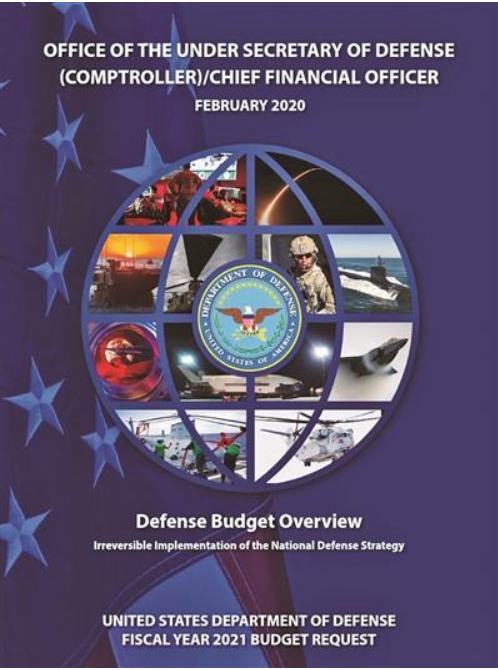
By Yang Chun
The US President Donald Trump submitted to the Congress the Fiscal Year (FY) 2021 defense budget draft bill on February 10, local time. Although the proposal may not be passed by the Congress, yet the related dynamics will have some bearing on America’s military build-up and global security and stability.
Details of the draft bill are made known to the public.
According to the document, America’s FY2021 defense budget stands at $740.5 billion, a 0.3 percent increase from the fiscal year of 2020, including $705.4 billion for the Department of Defense (DoD) and $35.1 billion for the Department of Energy and other defense-related government organs.
According to a DoD notice, the FY2021 defense budget re-prioritizes resources and shifts investments to prepare for a potential future, high-end fight by continuing to improve military readiness and invest in the modernization of a more lethal force; strengthening alliances and deepening interoperability; reforming the DoD for greater performance and accountability; and supporting service members and their families.
Investment focuses have sparked waves of controversy.
Like other budget draft bills previously released by the Trump administration, the FY2021 defense budget draft bill came under heated arguments in the country, especially in the military and between the two parties.
The draft bill is questioned for its focus on “being threatened”. It allocates a record $106.6 billion to R&D and experiment, of which up to $7.2 billion goes to Advanced Capabilities Enablers (ACEs), including hypersonic technology, microelectronics/5G, independent research and development and Artificial Intelligence (AI). Some American critics commented that the 2018 National Defense Strategy “misguided” the investment priority of defense spending, “strategic threat” is a fake hypothesis, and America’s “excessive defense investment” has failed to render itself more security.
The draft bill is criticized for “uneven distribution”. Before the draft bill was announced, the US Secretary of Defense Mark Esper said the FY2021 defense budget may be 3%-5% more than the FY2020 one considering the needs of the American forces and the interests of different services, but the final outcome is not only disappointing to him, but also drawing complaints from the services and arms.
The draft bill is deeply bogged in bipartisan struggle. The FY2021 defense budget bill isn’t immune to a war of words between the Democratic and Republic parties given their increasingly heated struggle. Bernie Sanders, a Democratic presidential candidate, slammed the draft bill for the policy tendency it demonstrates - to maintain global hegemony at the expense of the wellbeing of its own people. Some Democratic congress members, including Nancy Pelosi, Speaker of the House of Representatives, vowed that they wouldn’t let the draft bill get passed at the congress without much effort.
America’s belligerent tendency calls for caution.
Trump announcing the FY2021 defense budget bill fired his first bullet for the budget scramble and it may exert influences in the following aspects.
First of all, the budget game may get fiercer. Since taking office, Trump has been taking the defense budget increase as one of his major achievements, and he counted on the FY2021 defense budget to help him win the re-election. But the Democrats won’t go easy on him. Rather they will take advantage of their majority seats in the lower house to create hurdles for the draft bill. It’s foreseeable that the FY2021 defense budget won’t have a plain sailing. Besides, the various military services may also get deeply involved in the budget game out of their own interests and play a part in the final result.
Second, the US will enhance military build-up both in speed and quality. According to the draft bill, the American military is re-organizing its priorities and attaching more importance to the “usability” of nuclear forces, “effectiveness” of strategic anti-missile systems, development of space and other emerging forces, and advanced “enablers”. Since the current arguments in the country focus on the “inadequate” fund for some weapon platforms, the final budget will not see major adjustments, nor will its military development thought see a major adjustment either. It will continue to give birth to new capabilities based on new technologies, and then form new deterrence.
Third, Washington’s aggressive stance may aggravate confrontation. The American defense budget has long topped the world list and its focus of military build-up will affect other countries to varying degrees. The release of the FY2021 defense budget draft bill is likely to force other countries to speed up the development of hypersonic and AI weapons, which will disrupt the regional and global military balance and take a toll on global security and stability.











